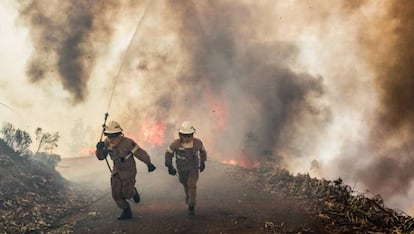The world braces itself for a future of heat waves
Scientists are predicting more frequent, more intense and longer-lasting extreme weather events

The persistent heat waves we are experiencing are starting to ring alarm bells. Last month, the World Meteorological Organization (WMO) warned that several countries in the western hemisphere had experienced extreme and unusual heat waves in May and June. Portugal was struck by a series of fires fueled by the heat, while Spain had the hottest spring on record. In Pakistan, Morocco and the UAE temperatures soared to record highs, while airplanes were grounded due to the heat in southwestern United States. And this, before summer has even begun.

In the city of Turbat in Pakistan, it was 53.5ºC on May 28, the highest temperature ever recorded there in the month of May and perhaps the highest ever recorded in Asia and even the world, barring the 56.6ºC logged in Death Valley, California, in 1913, and the 54ºC recorded in Kuwait in 2016.
In California, Nevada and Arizona, eight records were broken after being set only last year. In Phoenix, Arizona, where planes were grounded because of the heat, thermometers reached 47.8ºC on June 19. Of the 11,059 days in which temperatures have been recorded, this has happened just 15 times.
“Every year, summers are getting hotter, but extreme heat is still rare,” says Ed Hawkins, a climate researcher from the Meteorological Department at Reading University. “However, these incidents of extreme heat that pose a risk to human life are becoming more frequent.”
We don’t need to be frightened, but we do need to be worried
Omid Mazdiyasni, climate researcher at UC Irvine
Ricardo Francisco García Herrera, a climate expert from the Geoscience Institute at the Complutense University in Madrid explains that, every year since 1980, summers have been one day longer in Spain: “This means a rise in the average June temperatures to the tune of 0.5 to 1.2 degrees every decade.”
Last November, the WMO published a report on the global climate between 2011 and 2015, the hottest years on record – which should also include 2016. The report links the rise in temperatures to both the glut in natural disasters and climate change. These disasters include the drought in eastern and southern Africa between 2010 and 2015, floods in Southeast Asia in 2011, heat waves in India and Pakistan, and Hurricane Sandy in the US in 2012.
“Meteorologists take heat waves and the health problems they pose very seriously,” explains Clare Nullis, a WMO spokeswoman.

A study by the University of Hawaii published last month by Nature Climate Change magazine found 783 fatalities linked to heat waves in 164 cities in 36 countries between 1980 and 2014. The study, led by Colombian scientist Camilo Mora, concluded that 30% of the world’s population is exposed for at least 20 days a year to potentially dangerous temperatures. If measures are taken to slow down climate change, this percentage could still rise by 48% by the year 2100. If no measures are taken to reduce carbon emissions, it could rise by as much as 74%.
“There are a lot of ways to define a heat wave,” says Mora in a telephone conversation. “Temperatures are studied to see when they depart from the standard range. The problem with this system is that you could detect a heat wave in the North Pole. In the report, we define the variable as a heat rise that could be fatal.”
There is no such thing as a tolerable maximum temperature since much depends on humidity levels and the kind of heat the population is used to, as well as the conditioning of homes to deal with it. In general, the more humidity there is, the more dangerous heat can be.
Meteorologists take heat waves and the health problems they pose very seriously
Clare Nullis, WMO spokeswoman
The effect of a heat wave can be catastrophic: scientists estimate that during the 2003 heat wave, the worst ever recorded in Europe, around 70,000 people died. Since then, governments everywhere have put certain measures in place such as routine visits to the elderly.
Heat waves can also trigger other catastrophes such as fires, droughts, livestock death and crop loss. Think of it as climate disaster cooking over a low burner.
“According to the forecast of the Intergovernmental Panel for Climate Change (IPCC), heat waves are going to be increasingly frequent and intense in Spain and the rest of the world,” says Julio Díaz, head of the Epidemiology and Biostatistics Department at the National School of Health at Carlos III University, Madrid. “Heat waves can have diverse implications for health. Generally, heat waves kill the elderly and the sick, not those in good health. They mainly attack the circulatory and respiratory systems. The highest risk group is the over-65s – particularly women over 75.”
Climate change now has its own genre, known as climate fiction. One of the most famous novels on the subject is Shackleton’s Man Goes South by Tony White, which depicts a world in which survivors have had to migrate to the far north of the planet to escape deadly temperatures.
That scenario is still a long way off, but the 53.5ºC in Turbat is a concern. “We don’t need to be frightened, but we do need to be worried,” says Omid Mazdiyasni, a climate researcher at the University of California in Irvine, one of the areas most seriously afflicted by scorching heat. “There’s no direct threat to life but we do expect the heat waves to increase in intensity, frequency and severity. We need to work to reduce the impact of climate change and build an infrastructure that is resilient to extreme weather events.”
English version by Heather Galloway.
Tu suscripción se está usando en otro dispositivo
¿Quieres añadir otro usuario a tu suscripción?
Si continúas leyendo en este dispositivo, no se podrá leer en el otro.
FlechaTu suscripción se está usando en otro dispositivo y solo puedes acceder a EL PAÍS desde un dispositivo a la vez.
Si quieres compartir tu cuenta, cambia tu suscripción a la modalidad Premium, así podrás añadir otro usuario. Cada uno accederá con su propia cuenta de email, lo que os permitirá personalizar vuestra experiencia en EL PAÍS.
¿Tienes una suscripción de empresa? Accede aquí para contratar más cuentas.
En el caso de no saber quién está usando tu cuenta, te recomendamos cambiar tu contraseña aquí.
Si decides continuar compartiendo tu cuenta, este mensaje se mostrará en tu dispositivo y en el de la otra persona que está usando tu cuenta de forma indefinida, afectando a tu experiencia de lectura. Puedes consultar aquí los términos y condiciones de la suscripción digital.








































